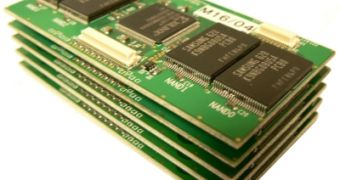Solid-State drives are touted as being the best storage alternative when it comes to mobile computing. They are light, take up less power and are not easily damaged by mechanical shocks. Just as the vast majority of notebook users fell in love with the miraculous storage solution, a report emerging from Avian Securities claims the contrary.
According to Avi Cohen, managing partner at the company, large notebook PC vendors get back 20 or 30 percent of the sold units because of either increased failure rates that occur in the flash-based storage drives, or because the customers are not pleased with the disks' performance. The report also claims that only 1 percent to 2 percent of notebooks are returned because of technical issues with conventional hard-disks.
Cohen claims that the failure rates of solid-state drives are much higher than encountered in their conventional counterparts. Moreover, in exchange of the extra $900 the user pays for a SSD update, they expect dramatically improved performance, which is not entirely met.
Dell, one of the most enthusiast promoters of the new storage media, admits that the solid-state drives are experiencing performance issues with applications that use small files, such as Microsoft Outlook. Dell also claims that this issue is fixed in Samsung's new line of solid-state drives, that is implemented in the PC vendor's mobile offerings.
However, the NAND flash industry would like to see increased demand in solid-state drives, but the single-level cell flash memory is still too expensive to become mainstream. At the same time, the multi-level cell flash memory is more affordable, but it's also less reliable and wears out 10 times faster than the SLC chips. Moreover, given the fact that the SLC flash, previously touted as "invincible" is experiencing problems, the MLC memory is obviously out of discussion.
According to Cohen, the reliability issues with the single-level cell flash will ultimately be fixed, but it takes time and, until then, the MLC industry cannot advance.

 14 DAY TRIAL //
14 DAY TRIAL //